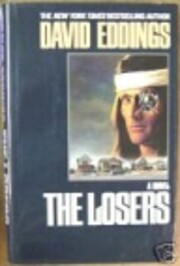

Click on a thumbnail to go to Google Books.
|
Loading... The Losersby David Eddings
 None No current Talk conversations about this book. Raphael Taylor was the perfect son of a shy woman and an unremarkable man. Gifted at football, beautiful to behold and intelligent Raphael was everybody's angel until he met Damon Flood. Manipulative and sly Damon contrived a plan to force Raphael's fall from grace until an ill-fated accident changed everything. I have never read anything by David Eddings before so I can't compare this story to any of his fantasy for which he is famous for. I will say his writing and ability to tell a tale is pretty good. The story was engrossing and easy to read. Unfortunately I didn't really agree with the underlying philosophy behind the story and was especially annoyed by the trial scene depicted in the last chapter. Another interesting thing is that this book was published by Del Rey and states "fantasy" on the cover, which it most assuredly is not. Since I am just reviewing the book and do not really want to have a moral argument (so to speak) with it I guess I will just say this: The book was well written but even so, since I didn't really like the ethics in the story I can't really recommend it. I also feel bad for anyone who picked up the story expecting a fantasy and wound up with a work of contemporary fiction. no reviews | add a review
Is contained in
Raphael Taylor was a golden boy-blond, handsome, charming, a gifted athlete and a serious student, an angel in every way. Damon Flood was a scoundrel¿a smooth, smilling, cynical devil, as devious and corrupt as Raphael was open and innocent. The day Raphael met Damon was the day he began his mysterious fall from grace. And the golden boy fell very fast and very far.... No library descriptions found. |
Current DiscussionsNonePopular covers
 Google Books — Loading... Google Books — Loading...GenresMelvil Decimal System (DDC)813.54Literature English (North America) American fiction 20th Century 1945-1999LC ClassificationRatingAverage: (3.42) (3.42)
Is this you?Become a LibraryThing Author. |
||||||||||||||||||||||||||||||||||||||||||||||||||||||||||||||||||||||||||||||||||||||||||||||||||||||||||||||||||||||||
It's hard to separate a book by Eddings from his other works, so this one keeps wandering near to fantasy without ever reaching it. We as readers have all the temptations to think of it in fantasy terms, as an urban fantasy about to shimmer into unreality, but it stays stubbornly in the real world right through to the end – but that's also probably the point. It's obviously an allegory, so by taunting the reader for a couple hundred pages and more about turning the corner into urban fantasy, the point seems to be less "why wasn't the 'Indian' secretly an Elf" like so many clichés but rather "it's just as much an allegory if it's fantastical or realistic." I actually liked that part of the novel a lot. My expectations were manipulated, extremely well, despite the "plain" style of the writing for this genre and a few consequently "lumpy" passages here and there.
I'm also deeply biased. I read through Eddings' manuscripts and lecture notes from being a tenured professor (he was) and his struggles with social workers, all of which are held at the Reed College library's special collections. So I couldn't help but feel the author behind the text (Reed and social workers figure prominently here). That was actually quite touching as a reader.
The surface "morale" of the story is self-reliance, and in this it's a classic bildungsroman showing the protagonist growing from child to "man." But like the allegory that doesn't care if you're worried about it breaking into a fantasy novel's confrontation between God and Satan or Good and Evil (Eddings would also humanize the evil and humble the good in his fantasy novels, to some degree), that surface level "morale" isn't really the main point. People grow up – meh… Meh. Novels have said that for a long time now… Self-reliance is also lovely, but we all need help, and we're all part of a community. Etc… What actually caught my attention and sympathy as a reader was the unspoken simple sympathy for those who suffer.
For me, it came in a simple juxtaposition in scenes (spoilers). The protagonist has a conflict with the final love interest (eschewing both "Love Story" and "The Freshman" as campus novel influences), after which she tells him to leave – fine, no surprise. Who wouldn't expect that? But with only a sentence gap, suddenly the same protagonist runs into an elderly alcoholic neighbour who expresses precisely the same sentiments of abandonment (and defense mechanisms to avoid the pain from it as the protagonist) when his dying "buddy" tells him not to come back again. The book is written as a pulp novel for a mainstream readership, but Eddings worked hard as a student to write *"literature"*. The words are simply and bumpy, but the juxtaposition is telling. Set aside the grand narrative of heroic daring do with maidens fair, and maybe a sympathetic eye can see their loving plight as awfully close to alcoholic bums taking care of each other in old age. That was terribly affective.
The ending wraps up quickly, and there's a superficial victory over the forces of evil, but it's also glib. If we take the closing scene and its specific language to task, then that whole story of defeating the forces of evil was hardly the point of the book. It's not Milton, but it's clever, and well read, so there's lots of Milton & Hemingway jumbled up with their religious struggles blurred and blended. It's the sort of popular pulp in which you can smell the hints at something more and a definite plan of what that something more would be, yet the refusal to get into it since that might break the bounds of the genre and its audience.
I enjoyed this book more than I had thought I would. (